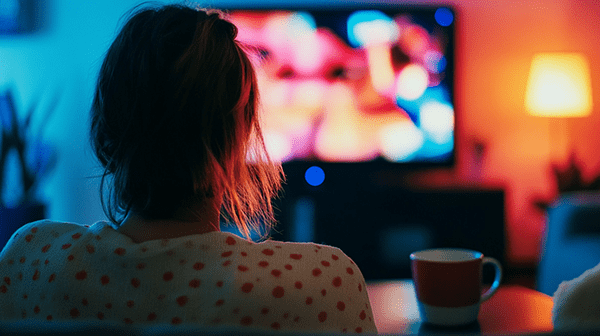
Watching too much TV?
Do you like to binge-watch TV? Well, here is some interesting research about people who binge-watch TV to reduce anxiety. In a study researching binge-watching TV, the authors categorize two types of watch patterns: feast-watching and cringe-watching.
This basically means that feast watching is intentional and sometimes social. This can be something like having friends come over to watch The Office. The author’s study also found that feast-watching sometimes improved mental wellness.
However, cringe-watching is not intentional and actually shows a decrease in mental wellness. This might be because the time spent cringe-watching is unintentional and is a product of procrastination, depression or stress avoidance.
Can watching TV help your anxiety?
In another study on binge-watching related to anxiety and depression, the authors found that when people intentionally used media like TV to help with anxiety, binge-watching decreased their anxiety. The authors found mixed results with people who had depression. For some, their depression decreased, but for just as many, their depression increased.
So what does this all mean? Well, I think the most important aspect is intentionality. When we find things that we know help our mental health, such as exercising, eating right or visiting with friends, we simply know we are taking care of ourselves, and that can reduce anxiety and depression. And if that means you feel better binge-watching TV and it doesn’t interfere or increase depression and anxiety, then go for it. The key point here is that knowing what works is up to you.
If you are finding it hard to manage your depression or anxiety, give me a call, and we can see if therapy is right for you.
References:
Gadino, N., Ellithorpe, M. E., Ulusoy, E., Wirz, D. S., & Eden, A. (2024). Binge-watching to feel better: Mental health gratifications sought and obtained through binge-watching. Psychology of Popular Media, 13(3), 407–415. https://doi.org/10.1037/ppm0000485
Pittman, M., & Steiner, E. (2021). Distinguishing feast-watching from cringe-watching: Planned, social, and attentive binge-watching predicts increased well-being and decreased regret. Convergence: The International Journal of Research into New Media Technologies, 27(5), 1507–1524. https://doi.org/10.1177/1354856521999183

